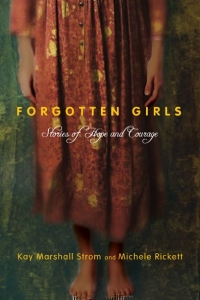October 25, 2009
Community Health Workers Save Lives by Sharing Basic Information
“A quarter of all child deaths in sub-Saharan Africa — which equals more than one million a year — take place during the first 28 days of life, according to the NGO Save the Children.” – “West Africa: The Hour Window to Find the Breast” by IRIN
I am passionate about the benefits of breastfeeding. When my newborn daughter had trouble nursing, I scoured every resource for answers, tried every position short of hanging upside-down, and sought advice from multiple doctors and lactation consultants. For months, nursing meant an arduous routine of long feedings, pumping to keep up my milk supply and supplementing so my daughter had enough to eat. As soon as one cycle was finished, it was time to start all over, and so I literally fed my daughter all day long. As it turned out, my daughter was tongue-tied, and when she was four months old, we traveled to New York to see a pediatric surgeon (that’s another story). With a simple snip, my daughter’s tongue was loosened, and she immediately began to feed more efficiently. I was able to quit pumping and supplementing, and nursed her until she was one. Knowing how good that breast milk was for my daughter, though we had to fight to continue, giving up wasn’t an option for me.
According to a recent article published by Integrated Regional Information Networks (IRIN), many mothers in parts of Africa are unknowingly cheating their children out of the life-giving benefits of breast milk out of ignorance. While we in the western world have access to basic nutritional information through doctors we regularly visit, these women often don’t. They wrongly believe the first milk their bodies produce after delivering a baby, the nutrient-rich colostrum, is dirty. As a result of this belief, rooted in superstition and tradition, the mothers refuse to feed it to their newborns, and instead, they throw it out,resulting in malnourished, immuno-compromised children.
Contrary to their ideas, colostrum is possibly the most nutritional breast milk a mother can feed her baby. It is highly-nutritive and passes important antibodies from the mother to the child, boosting baby’s immune system. What mother doesn’t want the best for her child if it is within her power to give it? But she cannot give what she does not know to give. A 2007 medical study shows that breastfeeding within the first hour of life can reduce infant deaths by 20%. Considering the statistics on infant deaths in certain African countries, it is imperative to teach these mothers how important it is to begin breastfeeding their babies as soon after delivery as possible.
However, “It is not enough to simply tell women why early breastfeeding is so important…[said WHO researcher, Carmen Casanovas]. If you just tell a mother she needs to breastfeed immediately after birth, she will not necessarily do it. Someone trusted needs to talk to her and work with her beliefs.” The article goes on to cite that a 2008 report showed that while these mothers weren’t buying the truth about breastfeeding from official sources, they were influenced by their peers and by community mother support groups.
I fought hard to continue nursing because I knew the statistics. For many mothers throughout the world, breastfeeding is a simple and easy way to boost their babies’ health, but they won’t do it if they don’t understand its importance. The knowledge is so simple, it doesn’t have to come from a doctor. SIS, who works in countries in Africa, such as Senegal, Mali and Sudan, where infant mortality is high, knows something about educating women about health and nutrition through their peers and through support groups. Through the transformation groups we help form and sustain in India, illiterate women from slums are being trained as community health workers. This benefits the community and the women themselves. As the women are trained, they are given new purpose and identity, and they quickly become respected “blessers” in their communities as the information they share saves lives.
October 13, 2009
The Hardest Place
It has been a several weeks since the flood of 2009 here in Atlanta. Though my house was not damaged, the images of houses completely submerged under water broke my heart. As I pray for those who lost so much in the flood, some even their loved ones, my thoughts turn to those in the hardest place that SIS ministers, the Sudan. With recent flooding, 200,000 have lost their homes. Even sadder, those who had no homes to begin, living in the nearest displaced persons camp, have lost what little they had and are now living alongside flood waters filled with disease-ridden sewage. It is hard to comprehend such loss, but even more so when we contemplate the daily horrors that are a normal part of life in Sudan. The following excerpt reflects the desperation of the Sudanese, particularly the women and girls, their fight to retain some hope weakened by their perception that their American brothers and sisters don’t seem to care. It is taken from Kay Marshall-Strom and Michele Rickett’s new book, Forgotten Girls: Stories of Hope and Courage.
‘ “Do our brothers and sisters in the West know what’s happening to us? Do they know we are being forced from our villages? That we are being raped and killed?”
Yes, we say, they know. The plight of the Sudanese is reported in newspapers and shown on television, and it saddens and horrifies us.
“If everyone knows,” they say, “where are God’s people who have freedom? Why don’t they help us?”
That’s why Sudan is the hardest place.’
Those Sudanese women – mothers, daughters, wives, widows – ask a difficult question. How can so many of us, living in freedom, hear their stories and turn our heads to go about our daily lives without intervening? How can we who know the precious grace of Christ in our own lives not fight for the oppressed? Is it because it’s too much for us to handle? Is it because we are too busy building our own American dream? Is it because we are paralyzed by the question of what we can do to help?
One thing is for sure, though I have struggled with all of those, the more I learn about those women and how different their lives are from mine, the more I am compelled to act. Awareness breeds action. I can’t get their suffering out of my mind. As a mother, I can’t help but ask, ‘What if my little girl had to endure even a fraction of the horrors those girls experience?” Girls like Amina and Khadijah (whose stories you can read in Forgotten Girls) living in war-torn Sudan have watched gunmen murder their families. I won’t even let my daughter watch television, fearing she might see some Hollywood violence that will steal her innocence.
Left alone and vulnerable without their families, Sudanese girls are the frequent victims of brutal repeated rapes. There are few opportunities for any schooling inside the refugee camps, resulting in an entire illiterate generation among the displaced. Food and basic necessities are scarce, and few aid organizations are allowed in Sudan anymore. SIS, however, is able to provide those basic necessities and help operate Christian schools for displaced children thanks to the unique way we minister – through local, established ministries like the Africa Inland Church. By meeting physical needs, SIS is also able to offer Christ, the Hope of Nations, to the hopeless.
Don’t know where to begin? Awareness is the first step toward action. To learn more about the plight of Sudanese women and girls and ways you can help, click here to order Forgotten Girls: Stories of Hope and Courage.
-Melissa, Mom on a Mission
August 4, 2009
Keeping Our Eyes Open
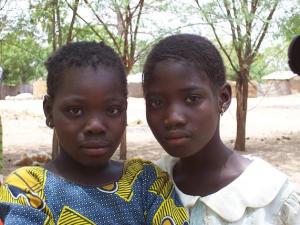
SIS fights for girls like these in Batale, Mali. Beliefs similar to those of the Liberian girl's family threaten their security, opportunity and even their lives.
You may have read or heard about the recent rape of an 8-year-old Liberian refugee girl in a Phoenix, AZ apartment complex. Four Liberian boys, ages 9 to 14, lured her with gum, then held her while they took turns sexually assaulting her. The girl’s assault and the shockingly young ages of her attackers are both tragedies. Equally as tragic is her family’s response – that they are shamed and embarrassed by their daughter.
In America, and in many other places internationally, we are bewildered and outraged by the irrational thinking that would place blame on such an innocent victim. I too, the mother of a little girl whom I would die to protect from any evil, am bewildered. But I am not surprised. Though these stories aren’t as frequent in America, the longer I work with Sisters in Service (SIS), the more I learn about how common this mindset is in much of the world. In many cultures, women and their families see sexual violence as a source of personal shame and familial embarrassment. So much so that organizations such as the United Nations Development Fund for Women (UNIFEM) and the World Health Organization (WHO) admit their statistics on rape are unreliable. Some believe that up to 95% of women who are sexually assaulted don’t report it. Women know they will receive little support at home, and in many instances will be blamed for the crime perpetrated against them. It is their ‘fault.’ Their victimization may even be fatal as families seek to uphold their honor at the expense of their abused daughters, sisters and wives in a practice called honor killing.
It is also common that when women do report their abuse to authorities, they receive no justice, even in countries where sexual assault is against the law. Cultural beliefs override the law books, and officials who should help the women don’t. It wasn’t until 2006 that rape was even outlawed in Liberia, where this little girl and her attackers are from. Three years later, women and girls in Liberia are often the worst victims of the turmoil in that country. Rape is so common that the courts cannot hear all of the cases, resulting in no justice for many like this little girl. .
Listen to these chilling statistics from UNIFEM. In Pakistan, Jordan, Syria, Egypt, Lebanon, Iran, Yemen, and in Europe among immigrant families it is possible that up to 5000 women a year are killed in the name of their family’s honor. Again, the statistics are unreliable because many of these deaths are reported as kitchen fires and accidents or not reported at all. A study of female deaths in Alexandria, Egypt showed that possibly 47% of those deaths were at the hands of a relative, most often her brother, after the woman or girl had been raped. Just as Sisters in Service and all major humanitarian organizations know, this is only a reminder that women and girls throughout the world are the most abused and oppressed.
That young Liberian girl, in a way, is fortunate that this happened in a country where her story would be told and justice demanded. So many throughout the world aren’t as privileged. These women may be made powerless by cultures that keep them silent, but we who have freedom and opportunities to speak out cannot look the other way when we read stories like this one. It may seem an overwhelming problem. And for those of
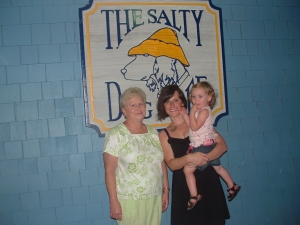
Three generations - my mom, me and my daughter!
us with our own families and full schedules, where do we start? Proverbs 28:27 says, “He who gives to the poor will lack nothing, but he who closes his eyes to them receives many curses.” Start by being informed. Keep reading these stories. Read Michele Rickett’s book Forgotten Girls, coming out in October of this year. Do a little research of your own. The WHO’s Multi-Country Study on Violence against Women is full of information. Then pray. Ask God how He wants you to respond to what you learn. Whatever you do, don’t close your eyes to their suffering.
Contact SIS using the links in the sidebar to find out more about how you can volunteer to make a difference in a little girl’s life.
June 24, 2009
Continue Praying for Maryam, Marzeih and Iran
The world is watching Iran now more than ever. Despite the pretense of freedom portrayed on June 12th as Iranians voted for their next leader, it didn’t take long for the truth of the Iranian citizens’ oppression to be revealed. Witnesses say that police have beaten mostly peaceful demonstrators ‘like animals’ with clubs and bats. Already several deaths have been reported. Iranian authorities have clamped down on reporters, forcing foreign journalists to remain in their hotel rooms to keep them from reporting what is happening on the streets in Tehran.
Though our own president has said that we and the international community are “appalled and outraged” at the way Iranian authorities are handling the demonstrations, as if this were some new behavior out of character for the government under Ahmadenijad, we know that it is in keeping with the historical treatment of women and girls whose stories have sparked SIS’s work and prayers. The way Ahmadenijad’s government has brutally handled this situation has only opened the world’s eyes to the intrinsic values and cultural practices that foster oppression.
Maryam and Marzeih are at the mercy of this same government, a fact that should ignite our fervent prayers for them. Their only possible crime is their belief in Jesus in a country that has a pattern of dealing violently with Christians, especially newly converted ones. Though they were being allowed to make brief calls to family before the current unrest, they are unable to receive any visitors. Parents and friends are forcefully turned away even when only asking about their well being.Thankfully, we know from one of their last phone calls that they are out of solitary confinement. Like Shadrach, Meshach and Abednego, they assure in coded message that there is another one with them in their cell. Jesus promised He would never leave us nor forsake us, and He is with them.
The Iranian church, from whom we are receiving updates, fears Maryam and Marzeih may be raped or hurt. Women are often raped before being killed in these situations because the interrogators believe that defiling them insures they will go to hell while the perpetrator will go to paradise. This knowledge should direct our prayers for Maryam and Marzeih in addition to all who are being arrested now in connection with the demonstrations.
The treatment of these women and violence against the demonstrators is unjust. Please continue to pray for them and share with your friends, family and church about their story. In our thoughts, actions and prayers, we cannot forget the victims of injustice.
Let justice roll on like a river, righteousness like a never-failing stream! Amos 5:24
June 19, 2009
Prayers Needed for Our Sisters in the Middle East
As the President of SIS meets this week with women from the Middle East, she is struck by how God is raising up courageous witnesses in those areas, particularly among women, and senses God wants us to be a part of it. These women are growing bolder in their faith, and they urgently need the help of those of us who can speak up for them in our churches and appeal for prayer, advocacy and the investment of resources on their behalf.
Most women in the Middle East are isolated behind walls, and violence against women and girls is common (they are beaten and sexually abused without recourse), daughters are married off (generally to an older relative), traded, sold or bride-napped. Muslim girls are the last to get good food or to receive medical help, leaving them underdeveloped in every way. Yet, there are ways to enter their pain-filled lives with the love of God, addressing these very issues by training more local Christian Middle Eastern women for holistic outreach. In From Fear to Faith: Muslim and Christian Women, Emily Van Dalen, who grew up in the Middle East, writes that in these societies “… women are viewed as intrinsically inferior beings. The sacred written traditions … present women as spiritually, intellectually, physically and morally deficient.”
Please Pray for:
1. God’s wisdom for our strategy discussions during this important week.
2. God’s provision for our partnership in the region. Several hundred courageous local women stand ready, but we currently have no funding for their training.
3. An area director for SIS for this region, and 2-4 volunteer lead advocates who have a heart to speak up for the women and girls.
4. And specifically and urgently, strength, protection and release for our sisters, Maryam and Marzeih, who are suffering imprisonment for their faith. Unlike the Iranian/American journalist who was recently freed from three months in jail, these women are not getting media coverage and are forgotten by the world’s eyes. Read their story below and join us in intercessory prayer for these women. Remember, the prayers of the righteous are powerful and effective and DO move the heart of God.
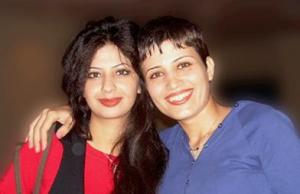
Marzieh Amirizadeh (30, on the right) and Maryam Rustampoor (27, on the left)
“Remember those in prison as if you were their fellow prisoners, and those who are mistreated as if you yourselves were suffering.” Hebrews 13:3
May 22, 2009
Mothers and Children in Slums
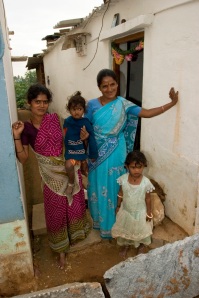
Moms and their daughters in Bangalore, India
Reflecting on the recent Mother’s Day, I have a new perspective on motherhood this year from information I’ve gained through Sisters In Service (SIS). As I reflect on what I’ve learned about Dalit “untouchable” girls in India, my mother’s heart is moved. If you are a mother, you know what I mean. There is a God-given maternal mechanism in those of us who have kids that makes us tender-hearted toward all children and especially to the struggles of every mom.
For instance, though we celebrate when a new baby is born, girls in the Untouchable caste are often seen as a curse. Many are poisoned or left to die soon after birth. 90% of abortions performed in India are to kill unwanted baby girls. In a caste system that ostracizes and abuses those at the bottom, the Dalit girls that do survive are the least of the least. My mother’s heart grieves for those girls and with their mothers who must follow the caste system. The question rises in me, “Why should my daughter have so much and these girls so little?” followed by, “What can I do to help?”
SIS works together with local Christian initiatives in rural India to organize Transformation Groups of 15-20 women where they are taught literacy, discipleship, given micro-loans and primary health training. SIS is already seeing changed lives in every way people can be changed. In a recent visit to India, the project manager and President of SIS witnessed:
- Spiritual walls crumbling
- Illiterate women learning vocational skills and providing for their families
- Slum women saving and even sacrificially giving their saved money to buy sewing machines to help other women in need
- Churches forming out of the Transformation Groups – over 600 recently baptized!
- Pastor’s wives trained in spiritual disciplines
- Women being trained as health care workers and saving lives in villages and slums
- Abused, alcoholic, and depressed women healing as they share their hurt with others
- Impoverished children dreaming of becoming doctors now that their parents can afford to send them to school
- Little girls, future wives and mothers, being told they are loved and valued as their own mothers bring the hope of Christ into their homes
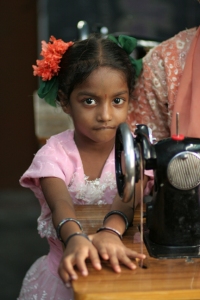
Young Indian girl whose family has already improved their standard of living through increased income thanks to the micro-loan that allowed them to obtain this sewing machine. There are many others waiting for the same chance.


Men in India will tell you that if you don’t reach a woman, you don’t reach her family. When one of these Dalit women learns a few basic skills and experiences Christ’s love, her children’s lives are changed


 .
.
When I think about the little girls growing up in the slums of India, I can’t help but picture my daughter in their place and cannot accept that their want is inevitable. In my mother’s heart, I know no child should grow up believing she is worthless.
Though I’m “just a mom” myself, I can help women and girls who live in India’s slums. Just as importantly, I want to model compassion to my daughter as I take small steps (like this blog) to raise awareness and resources to change lives. Think of what you might do to join me. I’d love to hear from you.
Melissa Hilliard, Mom on a Mission
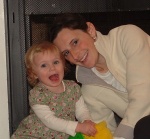
My daughter and me

